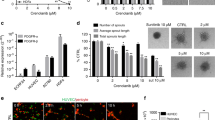Abstract
Background
Vascular endothelial growth factor (VEGF) plays a pivotal role in angiogenesis and is overexpressed in many kinds of malignant tumors. Soluble VEGF receptor 1 (sVEGFR-1/ soluble fms-like tyrosine kinase 1 [sFlt-1]) plays a role as an inhibitor of VEGF, and an antitumor effect has been shown in several studies using sFlt-1. Recently, in addition to its antiangiogenic effect, it was reported that sFlt-1 has direct cytotoxicity.
Materials and Methods
Transfection of sFlt-1 plasmid DNA was performed in the BeWo choriocarcinoma cell line. Overexpression of sFlt-1 in BeWo cells was confirmed by ELISA. In order to evaluate cell proliferation, cell counting and BrdU uptake assay were performed. Cytotoxicity was tested by LDH assay. TdT-Mediated dUTP Nick end Labeling (TUNEL) staining and quantitative analysis of caspase-cleaved keratin 18 (ccK18) level were done to evaluate cell apoptosis.
Results
The cell number was significantly less, and the ratio of cytotoxicity was significantly higher in sFlt-1 group compared to the control group. TUNEL staining and ccK18 level suggested nonapoptotic cell death.
Conclusion
Soluble Flt-1 showed a cytotoxic effect on BeWo cells. Our results suggest that sFLT-1 could be therapeutic for malignant tumors.
Similar content being viewed by others
References
Spannuth WA, Sood AK, Coleman RL. Angiogenesis as a strategic target for ovarian cancer therapy. Nat Clin Pract Oncol. 2008; 5(4):194–204.
Xu L, Jain RK. Down-regulation of placenta growth factor by promoter hypermethylation in human lung and colon carcinoma. Mol Cancer Res. 2007;5(9):873–880.
Charnock-Jones DS, Sharkey AM, Boocock CA, et al. Vascular endothelial growth factor receptor localization and activation in human trophoblast and choriocarcinoma cells. Biol Reprod. 1994; 51(3):524–530.
Mattern J, Koomägi R, Volm M. Association of vascular endothelial growth factor expression with intratumoral microvessel density and tumour cell proliferation in human epidermoid lung carcinoma. Br J Cancer. 1996;73(7):931–934.
Takahashi Y, Kitadai Y, Bucana CD, Cleary KR, Ellis LM. Expression of vascular endothelial growth factor and its receptor, KDR, correlates with vascularity, metastasis, and proliferation of human colon cancer. Cancer Res. 1995;55(18):3964–3968.
Yoshiji H, Gomez DE, Shibuya M, Thorgeirsson UP. Expression of vascular endothelial growth factor, its receptor, and other angiogenic factors in human breast cancer. Cancer Res. 1996; 56(9):2013–2016.
Ferrer FA, Miller LJ, Andrawis RI, et al. Vascular endothelial growth factor (VEGF) expression in human prostate cancer: in situ and in vitro expression of VEGF by human prostate cancer cells. J Urol. 1997;157(6):2329–2333.
Asano M, Yukita A, Matsumoto T, Kondo S, Suzuki H. Inhibition of tumor growth and metastasis by an immunoneutralizing monoclonal antibody to human vascular endothelial growth factor/vascular permeability factor121. Cancer Res. 1995;55(22): 5296–5301.
Kim KJ, Li B, Winer J, et al. Inhibition of vascular endothelial growth factor-induced angiogenesis suppresses tumour growth in vivo. Nature. 1993;362(6423):841–844.
Warren RS, Yuan H, Matli MR, Gillett NA, Ferrara N. Regulation by vascular endothelial growth factor of human colon cancer tumorigenesis in a mouse model of experimental liver metastasis. J Clin Invest. 1995;95(4):1789–1797.
Mori A, Arii S, Furutani M, et al. Vascular endothelial growth factor-induced tumor angiogenesis and tumorigenicity in relation to metastasis in a HT1080 human fibrosarcoma cell model. Int J Cancer. 1999;80(5):738–743.
Borgstro¨m P, Hillan KJ, Sriramarao P, Ferrara N. Complete inhibition of angiogenesis and growth of microtumors by antivascular endothelial growth factor neutralizing antibody: novel concepts of angiostatic therapy from intravital videomicroscopy. Cancer Res. 1996;56(17):4032–4039.
Yuan F, Chen Y, Dellian M, Safabakhsh N, Ferrara N, Jain RK. Time-dependent vascular regression and permeability changes in established human tumor xenografts induced by an anti-vascular endothelial growth factor/vascular permeability factor antibody. Proc Natl Acad Sci U S A. 1996;93(25):14765–14770.
Kim KJ, Li B, Houck K, Winer J, Ferrara N. The vascular endothelial growth factor proteins: identification of biologically relevant regions by neutralizing monoclonal antibodies. Growth Factors. 1992;7(1):53–64.
Hoshida T, Sunamura M, Duda DG, et al. Gene therapy for pancreatic cancer using an adenovirus vector encoding soluble Flt-1 vascular endothelial growth factor receptor. Pancreas. 2002; 25(2):111–121.
Takayama K, Ueno H, Nakanishi Y, et al. Suppression of tumor angiogenesis and growth by gene transfer of a soluble form of vascular endothelial growth factor receptor into a remote organ. Cancer Res. 2000;60(8):2169–2177.
Hasumi Y, Mizukami H, Urabe M, et al. Soluble FLT-1 expression suppresses carcinomatous ascites in nude mice bearing ovarian cancer. Cancer Res. 2002;62(7):2019–2023.
Goldman CK, Kendall RL, Cabrera G, et al. Paracrine expression of a native soluble vascular endothelial growth factor receptor inhibits tumor growth, metastasis, and mortality rate. Proc Natl Acad Sci U S A. 1998;95(15):8795–8800.
Gao ZN, Wei YQ, Yang PS, et al. Combined effects of soluble vascular endothelial growth factor receptor FLT-1 gene therapy and cisplatin chemotherapy in human tongue carcinoma xenografts. Oral Oncol. 2007;43(5):477–483.
Shibuya M. Involvement of Flt-1 (VEGF receptor-1) in cancer and preeclampsia. Proc Jpn Acad Ser B Phys Biol Sci. 2011;87(4): 167–178.
Miyake T, Kumasawa K, Sato N, Takiuchi T, Nakamura H, Kimura T. Soluble VEGF receptor 1 (sFLT-1) induces nonapoptotic death in ovarian and colorectal cancer cells. Sci Rep. 2016;6:24853.
Kumasawa K, Ikawa M, Kidoya H, et al. Pravastatin induces placental growth factor (PGF) and ameliorates preeclampsia in a mouse model. Proc Natl Acad Sci U S A. 2011;108(4):1451–1455.
Okada Y, Ueshin Y, Isotani A, et al. Complementation of placental defects and embryonic lethality by trophoblast-specific lentiviral gene transfer. Nat Biotechnol. 2007;25(2):233–237.
Fong GH, Rossant J, Gertsenstein M, Breitman ML. Role of the Flt-1 receptor tyrosine kinase in regulating the assembly of vascular endothelium. Nature. 1995;376(6535):66–70.
Maynard SE, Min JY, Merchan J, et al. Excess placental soluble fms-like tyrosine kinase 1 (sFlt-1) may contribute to endothelial dysfunction, hypertension, and proteinuria in preeclampsia. J Clin Invest. 2003;111(5):649–658.
Author information
Authors and Affiliations
Corresponding author
Rights and permissions
About this article
Cite this article
Yamashita, M., Kumasawa, K., Miyake, T. et al. Soluble Flt-1 Has Cytotoxic Effects on BeWo Choriocarcinoma Cells. Reprod. Sci. 25, 830–836 (2018). https://doi.org/10.1177/1933719117698575
Published:
Issue Date:
DOI: https://doi.org/10.1177/1933719117698575




